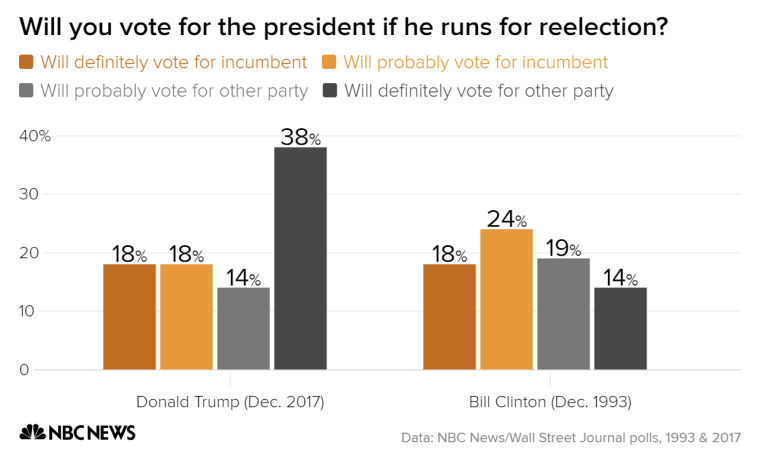WASHINGTON — Only about a third of Americans say that they will definitely or probably vote for Donald Trump if he runs for reelection in 2020, while half indicate that they’ll definitely or probably support his Democratic general election challenger, according to a new NBC News/Wall Street Journal poll.
The poll found that just 18 percent of those surveyed believe that they will "definitely" support Trump if he runs in the next presidential election, with another 18 percent saying that they’ll "probably" choose him. But a significant chunk — 38 percent — say they’re dead set on voting against the GOP commander-in-chief, with an additional 14 percent saying that they’ll probably vote for the Democrat on the ballot.
While even the most nascent stages of the 2020 presidential race are likely at least a year away — and, of course, it’s unknown who will run for and win the Democratic nomination, how a possible primary challenger to Trump might fare and even whether Trump will ultimately decide to pursue another term at all — the numbers are striking when compared to the nation’s mood about then-President Bill Clinton after the first year of his presidency.

In December 1993, just 14 percent of Americans told NBC/WSJ pollsters that they would definitely support a Republican rather than an already scandal-tarred Clinton. That's less than half of the share who now say they will definitely support a Democrat over Trump. (Clinton went on to win reelection with 49 percent of the vote.)
The partisan breakdown for Trump’s reelection support also shows signs of some potential fracturing within his own party. Among Republicans, 43 percent say they will definitely vote for Trump, while another 40 percent say they probably will. But among Democrats, three quarters — 73 percent — say they will definitely vote against Trump.
Additionally, some of Trump’s key coalition groups have shown a drop in their support since the 2016 election. For example, according to exit polls, 66 percent of white voters without a college degree backed Trump over Hillary Clinton, but just 47 percent now say that they will definitely or probably support him in 2020. The decline is similar among rural voters; 61 percent of rural voters supported Trump in 2016, while just 43 percent say they’re confident they’ll be in his corner in three years.
As Trump’s first year in office comes to a close, three-in-ten Americans overall say that the country is better off than it was when he became president, while 45 percent say it is in worse shape. Another 24 percent say that the state of the nation is about the same as when Trump took office.
The measures of Trump’s fitness for reelection and his impact on the country’s well-being come as he continues to face questions about Russian interference in the 2016 election and potential obstruction of justice into the Russia investigation.

The new survey finds that 41 percent of Americans want Congress to hold impeachment hearings to remove Trump from office, including 70 percent of Democrats, 40 percent of independents and seven percent of Republicans. That data largely mirrors the shares within each party that believe that the Trump campaign actively colluded with Russia during the 2016 election. Overall, 38 percent of Americans believe there was collusion, 35 percent believe there was not and 26 percent say they don’t know enough to say. Those who believe collusion occurred include 65 percent of Democrats, 35 percent of independents and six percent of Republicans.
The NBC/WSJ poll was conducted Dec. 13-15 of 900 adults — about half reached via cell phone — and it has an overall margin of error of plus-minus 3.3 percentage points.

